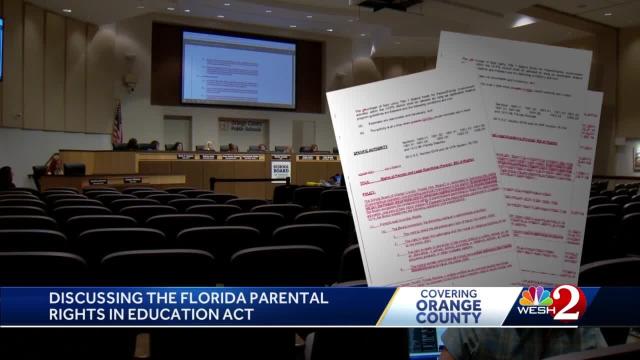Orange County School Board discusses policy on Parental Rights in Education law
Wesh2 | Anika Hope | November 28, 2022
ORANGE COUNTY, Fla. —
The Orange County School Board met Monday to figure out how to implement some of the most controversial pieces of legislation in recent Florida history.
Florida’s Parental Bill of Rights and Parental Rights in Education laws outline the rights of parents to direct their child’s education and health care, as well as prohibit classroom instruction on sexual orientation and gender identity.
It requires each district’s school board to adopt a policy consistent with the statutes.
Board members tackled the wording of the policy and exactly how Florida’s controversial law will be implemented in Orange County classrooms.
“They’re going to have some issues. There are going to be some teachers who will feel so frustrated because they just want to teach,” Vicki-Elaine Felder, an Orange County School Board member representing District 5, said.
Thousands of parents filled out surveys and gave their feedback.
The board members said they can’t change the statute, but they could try to clarify the Orange County Public Schools policy to answer parents’ questions.
Based on parent feedback, the policy now explicitly states that a student in AP, IB or similar programs cannot opt-out of the required curriculum and stay in the program.
“There are certain AP ones where there are books required, additional reading. And those books have explicit content. They are adult books. It’s an adult class. It’s a college-level class, ” Alicia Farrant, an Orange County School Board member representing District 3, said.
If a parent opts their child out of the state-mandated curriculum, the policy states, they will not get replacement assignments. That could impact their grades.
“If the state says you must take XYZ … if you don’t learn it, there’s a consequence,” Teresa Jacobs, Orange County School Board chair, said.
Parents are allowed to opt their child out of parts of health education that involve reproductive health, HIV and AIDS without consequence, according to the policy.
“They have the right to opt-out and they should not be penalized for opting out,” John Palmerini, OCPS deputy general counsel, said.
Several board members agreed the policy means the most basic of health services, like vision and hearing screenings, will always require consent forms.
Parents will be able to give their feedback on the revised policy when it is presented at a public hearing on Dec. 13.
“I really think again it comes down to transparency,” Farrant said.
It will be held at the Educational Leadership Center on West Amelia Street.






